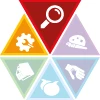Analyst

Analysts will often perform the following tasks:
- Identifying the underlying principles, reasons, or facts of information by breaking down information or data into separate parts.
- Using relevant information and individual judgment to determine whether events or processes comply with laws, regulations, or standards.
- Assessing the value, importance, or quality of things or people.
- Compiling, coding, categorizing, calculating, tabulating, auditing, or verifying information or data.
Inspector

Inspectors should be great at:
- Estimating sizes, distances, and quantities; or determining time, costs, resources, or materials needed to perform a work activity.
- Observing, receiving, and otherwise obtaining information from all relevant sources.
- Identifying information by categorizing, estimating, recognizing differences or similarities, and detecting changes in circumstances or events.
- Inspecting equipment, structures, or materials to identify the cause of errors or other problems or defects.
Other work activities related to Geographers
- Creating and modifying maps, graphs, or diagrams, using geographical information software and related equipment, and principles of cartography, such as coordinating systems, longitude, latitude, elevation, topography, and map scales.
- Writing and presenting reports of researching findings.
- Developing, operating, and maintaining geographical information computer systems, including hardware, software, plotters, digitizers, printers, and video cameras.
- Locating and obtaining existing geographic information databases.
- Analyzing geographic distributions of physical and cultural phenomena on local, regional, continental, or global scales.
- Teaching geography.
- Gathering and compiling geographic data from sources including censuses, field observations, satellite imagery, aerial photographs, and existing maps.
- Studying the economic, political, and cultural characteristics of a specific region’s population.







